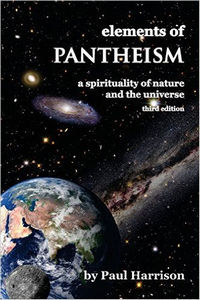Pantheist beliefs
by Paul Harrison.
Scientific Pantheism is above all all an emotional response
of reverence and belonging to Nature and the wider Universe
in all their power, beauty and mystery, as revealed to us
by our senses and by science.
 Scientific Pantheism is above all a profoundly
emotional response to Nature and the wider Universe. It accepts that these
are the only reality that we can truly know, the only reality that truly
matters, the only reality we have to relate to. They are the place we arose,
the place we belong, the context of our daily lives. We are at home here.
Science and our senses tell us about what the world is really like, Scientific Pantheism expresses how we feel about that reality.
Scientific Pantheism is above all a profoundly
emotional response to Nature and the wider Universe. It accepts that these
are the only reality that we can truly know, the only reality that truly
matters, the only reality we have to relate to. They are the place we arose,
the place we belong, the context of our daily lives. We are at home here.
Science and our senses tell us about what the world is really like, Scientific Pantheism expresses how we feel about that reality.Elements of Pantheism: Get the Book That emotional response has two primary elements. One is a sense of awe, wonder, reverence and acceptance of the natural universe, based on its power and beauty and mystery. This sense is the basis for some pantheists' use of words such as "god" "divine," though these words are never used in their traditional Western theistic sense of a creator being. However, most scientific pantheists prefer to avoid theistic words because of they evoke in most people the idea of a personal judging creator god. The other is a sense of belonging, of community with the starry skies,
with all living beings nd with our own bodies. This sense is the basis for
statements about the unity of all things, and about the unity of the
individual with the whole. It is the basis on which pantheists can talk
about and experience union with the whole, similar to the
experiences of mystics in all spiritual traditions. |
Basics
Principles
Related movements
Polemics
|
|
Pantheist
Beliefs The major ideas and debates |
|
Pantheist Practice Living and celebrating |
|
History of Pantheism From Lao Tzu to Einstein |

